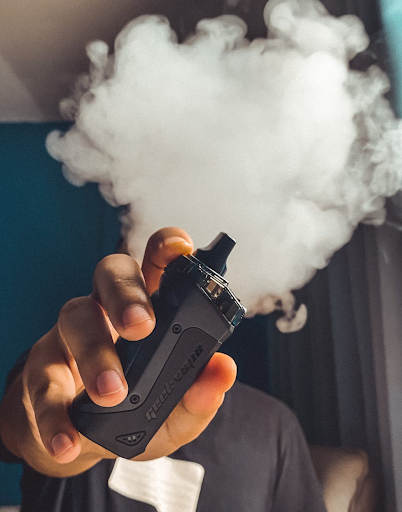When diagnosed with obstructive sleep apnea, most sleep physicians recommend that patients quit smoking for several reasons. Smoking increases the risk of health issues like heart disease, stroke, hypertension, and airway inflammation. Untreated sleep apnea also has a higher risk of these same health problems, meaning that an untreated sleep apnea patient who smokes has a much greater chance of experiencing these problems.
Often, sleep apnea patients who are told to quit smoking switch over to vaping as an alternative. Is vaping as bad as smoking? Does vaping worsen the symptoms of sleep apnea? Follow along as ApneaMed walks you through how vaping impacts sleep apnea patients.
What Is Vaping?
An electronic cigarette, also known as a vape, heats a liquid combination of chemicals, nicotine, and other ingredients to create an aerosol that is inhaled by the user. It’s a common alternative for patients looking to give up smoking since it mimics similar behavior, however, it still has harmful effects on the individual.
Although fewer carcinogens are ingested when vaping than when smoking cigarettes, the main ingredient, nicotine, remains the same, and vape pens often contain far more of it. Nicotine is a highly addictive ingredient, which results in the individual vaping more often and irritating their airways. This means that the inhaled toxins can still increase the risk of lung disease, heart disease, and throat or nasal cancer.
How Vaping Affects Sleep Quality
No matter how you’re ingesting nicotine, through a cigarette or e-cigarette, it can negatively impact your quality of sleep. When nicotine is introduced into the user’s system, it increases their heart rate, causes their blood pressure to rise, and produces adrenaline. Vaping in the evening before bed can make it incredibly difficult to relax the mind and body to fall asleep.
Along with making it difficult for the individual to fall asleep, it can disrupt the person’s REM cycle. Because of their withdrawal from nicotine, their body won’t be able to stay in the REM cycle and disrupt the body’s circadian rhythm.
How Vaping Affects Sleep Apnea
A common misconception is that e-cigarettes don’t have the same impact on sleep as standard cigarettes do. Because vapes contain nicotine, they will still affect your sleep cycle and cause inflammation of your airways. Obstructive sleep apnea already makes it challenging to breathe throughout the night, and vaping can stimulate the upper airway muscles and make breathing even more difficult.
As a result, the sleep apnea patient is likely to experience frequent breathing disruptions while they sleep, significantly lowering their sleep quality.
If diagnosed with sleep apnea, the individual should avoid vaping or smoking to help improve their sleep quality and lessen the inflammation in their airways.
The Importance of Sleep Apnea Testing
If a patient exhibiting sleep apnea symptoms are also vaping, they should receive a sleep assessment to avoid having heightened sleep apnea.
A home sleep study is more affordable and less time-consuming than a standard sleep study. The individual will receive the home sleep test and instructions on administering an overnight unattended sleep study. While sleeping, the device will record the patient’s blood oxygen levels, heart and breathing rates, and how often their body moves blood oxygen saturation.
Following the self-administered test, the results will be analyzed by one of ApneaMed’s board-certified sleep physicians. They will provide a recommended treatment for sleep apnea, which provides the best results when the individual stops vaping or smoking cigarettes. Standard treatment is the use of an automatic positive airway pressure machine, otherwise known as APAP.
Contact our team to learn more if you have any questions about ApneaMeds’ at-home sleep apnea test or our sleep apnea treatment equipment.

